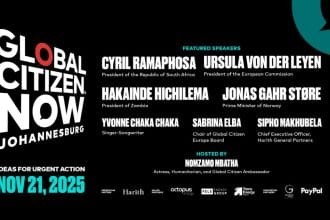South African activist Mandla Mandela, grandson of the late Nelson Mandela, along with other South Africans, is set to be released today from Israeli detention. The group was detained during an international humanitarian mission aimed at delivering aid to Gaza. The South African Department of International Relations and Cooperation (DIRCO) confirmed that the activists would be repatriated via Jordan, ensuring their safe return to South Africa.
- South African Activists, Including Mandla Mandela, Headed for Repatriation
- Details of the Global Sumud Flotilla Mission and Interception by Israel
- South African Government’s Response to the Detention
- The Role of International Pressure in Securing the Release
- Reactions from Mandla Mandela’s Family and Global Activists
- What Lies Ahead for Mandla Mandela and His Fellow Activists?
South African Activists, Including Mandla Mandela, Headed for Repatriation
The release of Mandla Mandela and other South African detainees marks the end of a tense and uncertain week. South African authorities were notified by Israeli officials that the group would be repatriated on Tuesday morning. DIRCO spokesperson Chrispin Phiri confirmed that the activists, including Mandla Mandela, will leave Israel via Jordan before returning to South Africa.
For more on the latest news, read about the fire contained at Charlotte Maxeke Hospital, sparked by a psychiatric patient.
Minister Ronald Lamola of DIRCO expressed gratitude for the cooperation shown by all involved parties, both locally and internationally. He praised the efforts made to ensure the safe repatriation of South African citizens who had been detained while participating in a global humanitarian mission.
Details of the Global Sumud Flotilla Mission and Interception by Israel
The detained South Africans were part of the Global Sumud Flotilla (GSF), a civilian-led initiative aimed at delivering food and medical aid to Gaza. The flotilla, consisting of 41 vessels carrying over 400 passengers, was intercepted by Israeli naval forces in international waters on October 1, 2025. The mission was comprised of various activists, human rights defenders, and medical professionals.
The Israeli navy detained 296 people from multiple countries, including Mandla Mandela. While the interception prevented the flotilla from reaching Gaza, 30 vessels managed to continue their journey despite the blockade. Israel’s actions were controversial, with critics claiming that they violated international law and infringed on the sovereignty of the nations whose flags the ships flew.
South African Government’s Response to the Detention
The South African government, under President Cyril Ramaphosa, quickly condemned the detention of Mandla Mandela and his fellow activists. On October 2, Ramaphosa called for the immediate release of all South African detainees, labelling the interception an illegal act.
Ramaphosa’s statement emphasised that the flotilla was a humanitarian mission, meant to bring aid to Gaza’s besieged population. He condemned Israel’s actions as a violation of international law, specifically citing the International Court of Justice’s injunction that humanitarian aid must not be obstructed.
Read more about the tragic shooting of Alexandra community leader Vincent Ndima.
The Role of International Pressure in Securing the Release
Global pressure from various governments, human rights organisations, and activists helped pave the way for the detainees’ release. The South African government’s diplomatic efforts were bolstered by public outcry and advocacy campaigns, both domestically and internationally.
In addition to South Africa’s push for the release, other international figures, including Greta Thunberg, who was also detained during the flotilla mission, voiced their condemnation of Israel’s actions. Thunberg, along with other activists, expressed disappointment over the international community’s response to the humanitarian crisis in Gaza.
Reactions from Mandla Mandela’s Family and Global Activists
Mandla Mandela’s wife, Nosekeni Rabia Mandela, described the situation as “turbulent” but acknowledged that they were prepared for the risks involved in such a mission. She shared the emotional toll of the past weeks and highlighted the precariousness of their mission, given the ongoing political tensions in Gaza.
International figures, including Greta Thunberg, have been vocal about the plight of the activists, stating that the global community has done too little to address the suffering in Gaza. Thunberg, upon her deportation from Israel, declared that the mission to Gaza was necessary, but it was a shame that such humanitarian aid efforts had to exist.
What Lies Ahead for Mandla Mandela and His Fellow Activists?
As Mandla Mandela and the other detained activists prepare for their repatriation, there is still much to consider. Their experience underscores the broader challenges faced by international humanitarian missions in conflict zones. The global community continues to debate how to best address the ongoing humanitarian crisis in Gaza, while ensuring the safety and rights of those seeking to provide aid.
The South African government’s commitment to its citizens’ safety abroad remains unwavering, and the return of Mandela and his fellow activists is a significant moment in the ongoing discourse surrounding humanitarian efforts and international law.
Find out more about the tragic Bronkhorstspruit tavern shooting that left five dead and six injured.
The release of Mandla Mandela and the South African activists from Israeli detention is a positive development, driven by diplomatic negotiations and international pressure. While their mission to Gaza was obstructed, it has highlighted critical issues surrounding the blockade of Gaza, the role of humanitarian aid, and the enforcement of international law. As these activists return to South Africa, their journey reflects the complexities of global solidarity and the ongoing struggle for peace in the Middle East.













